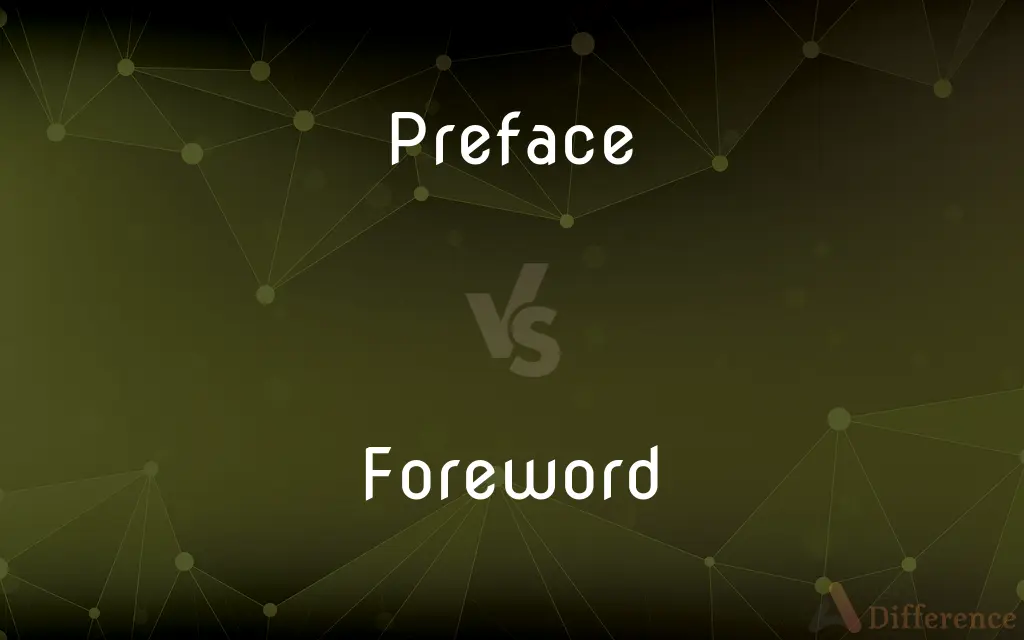Preface vs. Foreword — What's the Difference?
By Tayyaba Rehman — Updated on September 15, 2023
A Preface is written by the author explaining the book's origins and purpose; a Foreword is an introductory note, often by someone other than the author, endorsing the book.

Difference Between Preface and Foreword
Table of Contents
ADVERTISEMENT
Key Differences
Both Preface and Foreword serve as introductory pieces to a book, offering context and setting the stage for what's to follow. The Preface is generally penned by the book's author and delves into the genesis, nature, and purpose of the work. It's a space for authors to convey why they wrote the book, its significance, and what they hope readers will glean from it. In contrast, the Foreword is typically composed by someone other than the main author, offering a third-party perspective on the book's value and relevance.
While the Preface often gives insights into the book's creation journey, from initial idea to final execution, the Foreword tends to be more about the work's importance in a broader context. This is why you'll frequently find renowned figures in a particular field writing the Foreword for a book within that domain. Their endorsement can lend credibility to the work and pique readers' interest.
From a structural standpoint, the Preface and Foreword can appear similar, but their intentions are distinct. The Preface acts as a bridge between the author and the reader, inviting them into the personal motivations and aspirations behind the work. On the other hand, the Foreword seeks to position the work within a broader context, often explaining its significance to potential readers and the larger world.
In essence, while both Preface and Foreword are crucial components of many books, they offer different perspectives. The Preface is the author's voice explaining the backstory and goals, whereas the Foreword is a commendation, usually from an external authority, illuminating the book's value and importance.
Comparison Chart
Authorship
Written by the book's author.
Often written by someone other than the author.
ADVERTISEMENT
Purpose
Explains the book's genesis and purpose.
Endorses the book, highlighting its value.
Position
Typically before the Foreword.
Typically after the Preface.
Perspective
Author's personal insights.
External viewpoint on the book's significance.
Relation to the main content
More closely tied to content details.
More general, broader context.
Compare with Definitions
Preface
A starting segment where the author sets the context for readers.
In the Preface, the historian outlined the sources used for the book.
Foreword
An introductory endorsement of a book, typically by someone other than its author.
The Foreword, penned by a renowned scientist, praised the research's authenticity.
Preface
An introduction by the author discussing the book's inception and objectives.
In the Preface, Jane described her decade-long research journey.
Foreword
A beginning section that emphasizes the book's importance from an external viewpoint.
The award-winning author's Foreword highlighted the novel's relevance in modern times.
Preface
The author's reflection on the process and aim of the book.
The memoir's Preface revealed the therapeutic nature of writing for the author.
Foreword
An opening endorsement that attests to the book's credibility.
In the Foreword, the professor explained why the textbook is a must-read for students.
Preface
A preface () or proem () is an introduction to a book or other literary work written by the work's author. An introductory essay written by a different person is a foreword and precedes an author's preface.
Foreword
A preliminary piece that contextualizes the book within a larger domain.
The Foreword drew parallels between the book and major literary works of the past.
Preface
A preliminary statement or essay introducing a book that explains its scope, intention, or background and is usually written by the author.
Foreword
An introduction by a third party detailing the book's significance.
The Foreword, written by a celebrity, shared how the book impacted their life.
Preface
An introductory section, as of a speech.
Foreword
A foreword is a (usually short) piece of writing sometimes placed at the beginning of a book or other piece of literature. Typically written by someone other than the primary author of the work, it often tells of some interaction between the writer of the foreword and the book's primary author or the story the book tells.
Preface
Something introductory; a preliminary
An informal brunch served as a preface to the three-day conference.
Foreword
A short introduction to a book, typically by a person other than the author.
Preface
Often Preface The words introducing the central part of the Eucharist in several Christian churches.
Foreword
A preface or an introductory note, as for a book, especially by a person other than the author.
Preface
To introduce by or provide with a preliminary statement or essay.
Foreword
An introductory section preceding the main text of a book or other document; a preface or introduction.
Preface
To serve as an introduction to.
Foreword
A preface.
Preface
A beginning or introductory portion that comes before the main text of a document or book, typically serving to contextualize or explain the writing of the book and sometimes to acknowledge others' contributions.
The book included a brief preface explaining the author's motivations for writing.
Foreword
A short introductory essay preceding the text of a book
Preface
An introduction, or series of preliminary remarks.
Preface
(Roman Catholic) The prelude or introduction to the canon of the Mass.
Preface
A title or epithet.
Preface
(transitive) To introduce or make a comment before (the main point).
Let me preface this by saying that I don't know him that well.
Preface
(transitive) To give a preface to.
To preface a book
Preface
Something spoken as introductory to a discourse, or written as introductory to a book or essay; a proem; an introduction, or series of preliminary remarks.
This superficial taleIs but a preface of her worthy praise.
Heaven's high behest no preface needs.
Preface
The prelude or introduction to the canon of the Mass.
Preface
To introduce by a preface; to give a preface to; as, to preface a book discourse.
Preface
To make a preface.
Preface
A short introductory essay preceding the text of a book
Preface
Furnish with a preface or introduction;
She always precedes her lectures with a joke
He prefaced his lecture with a critical remark about the institution
Preface
The author's preliminary statement explaining the work's background.
The Preface provided a sneak peek into the challenges faced during writing.
Preface
An initial section detailing the reason the book was written.
His Preface shed light on personal experiences that inspired the novel.
Common Curiosities
Can a book have both a Preface and a Foreword?
Yes, many books feature both, with the Preface usually preceding the Foreword.
Does the Foreword affect the credibility of a book?
It can, especially if written by a respected figure in the field, as it can act as an endorsement.
Is a Preface always necessary in a book?
No, it's optional, but it can offer readers valuable context about the work.
What is the main purpose of a Preface?
A Preface explains the book's origins, purpose, and the author's motivations.
Who usually writes the Foreword?
The Foreword is often written by someone other than the book's author, providing an external perspective.
Is the Preface part of the main content?
No, the Preface is a preliminary section that sets the stage for the main content.
Can the author write the Foreword?
While less common, authors can write their own Forewords, especially in later editions or reprints.
Share Your Discovery

Previous Comparison
Slave vs. Mistress
Next Comparison
Edwardian vs. VictorianAuthor Spotlight
Written by
Tayyaba RehmanTayyaba Rehman is a distinguished writer, currently serving as a primary contributor to askdifference.com. As a researcher in semantics and etymology, Tayyaba's passion for the complexity of languages and their distinctions has found a perfect home on the platform. Tayyaba delves into the intricacies of language, distinguishing between commonly confused words and phrases, thereby providing clarity for readers worldwide.
















































